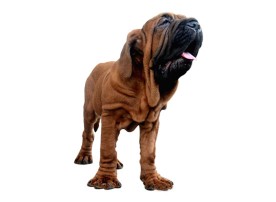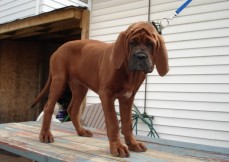Country of Origin: South Korea
Dog Group: Working
Origin of Name: The Korean Dosa Mastiffs, also called Mee Kyun Dosa, have their origin in South Korea. The heavy-built, wrinkled dog looks fearsome, but it is a gentle breed that gets attached to its master fairly easily.
Shedding
A bit LowMonthly keeping cost
Premium(Rs.8k to10k) Standard
Size
LargerBreed Info
Life span : 7-12 years
Availability: Rare
About Korean Mastiffs
Korean Mastiffs is one of the rarest breeds, known for its heavily wrinkled body. The body is so wrinkly that even its eyes are barely visible."The Korean Dosa Mastiffs, also called Mee Kyun Dosa, have their origin in South Korea. The heavy-built, wrinkled dog looks fearsome, but it is a gentle breed that gets attached to its master fairly easily. The dog gets along well with children and also with fellow pets. But the mastiff does not mingle easily with strangers.
The origin of the Korean Mastiff can be traced back to late 19th century Korea. Enthusiasts believe that these dogs were developed by crossing such breeds as the Tosa Inu, Neapolitan Mastiff, Bloodhound, and the Dogue de Bordeaux, though this has never been proven scientifically or otherwise.
Throughout its history, the Korean Mastiff has been most commonly used as a watch and guard dog, show dog, and kept as a pet, proving its superior abilities to provide protection, entertainment, and an enthusiastic friendship.
Today, while the Korean Mastiff has attained an underground popularity as a working, show, and companion dog, the breed remains rather rare outside of its native Korea.
Korean Mastiff is obedient, loyal, loving, and very affectionate. The Korean Mastiff is not suited for full-time indoor or apartment living, as it enjoys spending time outdoors, taking long walks, and playing games such as fetch and tug-of-war.
Maintenance
Visits to Groomer-Medium
Drooling-No
Bath-Monthly bath require
Tolerance to heat- Get a heatstroke
Tolerance to cold-Loves snow
Exercise Requirement-Lots
Hair & Coat
Under Coat-Yes
Colour- deep orange, red and brown
Coat Type- short, smooth and flat
Hair Length-Short
Hair Density-Dense
Health
While the Korean Mastiff is typically known as a healthy and hearty breed, they do suffer from a few health problems, including:
Hip dysplasia
Elbow dysplasia
Patellar luxation
Dislocation of the knee
Entropian
Ectropian
Cherry eye
Anesthesia
Obesity
Bloat
More
Temperament
The dog’s look should not fool you; although the KOREAN MASTIFF looks intimidating, they are actually a very kind and docile breed. These dogs tend to bond closely with owners and want nothing more than human company. They are great with children and other dogs of all sizes. Early socialization is important with this breed and if done properly, you will get a good-natured dog that is both protective and gentle.
Training & Intelligence
Due to its need for human attention and outgoing attitude, the Korean Mastiff generally responds well to basic training and commands. These bright dogs have the ability to learn to perform most any task their trainer is willing to take the time to teach.
Establishing immediate dominance, trust, and respect is key to successfully training the Korean Mastiff. This breed can be somewhat sensitive to criticism and respond best to positive reinforcement and reward-based training.
Breeding
Litter Size-4 to 6 puppies (approximately)
Complication in Breeding-No
Procreation
Korean Mastiff are extremely healthy and sturdy a breed and can be mated after it reaches a mature age of 1.5 years - 2 years. Before mating, it will be advisable to see the medical history of the mate to rule out any medical conditions that may be transferred genetically. If you are a first time pet parent, you might want to seek medical help from a veterinarian for the neonatal care and care post the delivery of the pups.

 DogExpress
DogExpress

















 in Chandigarh, India.
in Chandigarh, India. 
